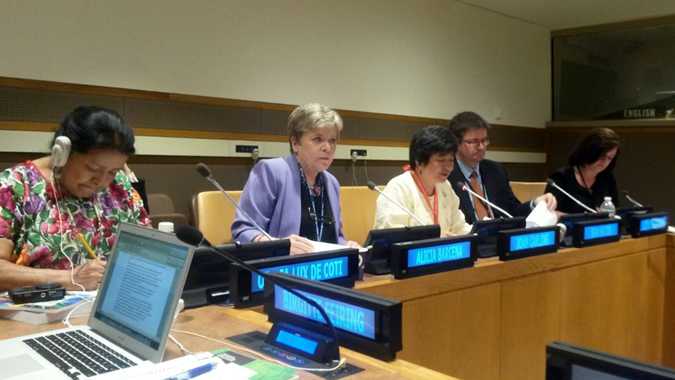ECLAC Supports Statistical Visibility and Participation of Indigenous Peoples in the 2030 Agenda
Work area(s)
The regional organization’s Executive Secretary, Alicia Bárcena, participated in a side event to the High Level Political Forum on Sustainable Development 2016 being held in New York.

The Executive Secretary of the Economic Commission for Latin America and the Caribbean (ECLAC), Alicia Bárcena, presented today in New York the work done to date by the regional organization and its new proposals to foster the statistical visibility of indigenous peoples and ensure their participation in the implementation of the 2030 Agenda for Sustainable Development.
ECLAC’s most senior representative spoke at the gathering entitled “Moving Forward: Securing the rights and contributions of indigenous peoples in the 2030 Agenda,” which was held at the United Nations headquarters on the sidelines of the High Level Political Forum on Sustainable Development. At this event, participants exchanged proposals to guarantee that indigenous peoples are not left behind in the implementation of the 2030 Agenda, adopted in 2015.
“For ECLAC it is a priority to end the statistical silence and make indigenous peoples visible via the disaggregation of data,” said Alicia Bárcena, who highlighted the progress achieved in the population censuses of Latin American countries. “While in the 1990 round only two censuses included the criteria of self-identification, by the 2010 round it was present in 21 of them,” the Executive Secretary emphasized.
Bárcena explained that the organization offers technical assistance to the region’s countries to support the inclusion of questions regarding indigenous peoples in censuses and administrative records; also, with the collaboration of indigenous organizations, it produces and generates updated knowledge that is featured in numerous studies and a specialized database.
As a result of this work, the organization’s latest figures indicate that around the year 2010 some 45 million indigenous persons were living in Latin America (8.3% of the regional population), versus the 30 million that had been estimated in 2000, an increase that is the result not only of demographic growth but also, above all, of this population’s greater visibility in censuses.
In terms of data, the Executive Secretary highlighted the importance of analyzing inequalities related to income, gender, education, health and other gaps that indigenous peoples are exposed to. As an example, she indicated that on average, without distinguishing between educational levels, the wage income of men who are neither indigenous nor Afro-descendant quadrupled that of indigenous women and nearly doubled that of Afro-descendant women.
Alicia Bárcena also warned about the increase in socio-environmental conflicts that affect indigenous peoples and advocated for respecting their territorial rights, as well as their right to participation and to free and informed consent. In the case of Latin America, between 2009 and 2013, researchers identified 235 conflicts created by extractive industrial projects (mining and hydrocarbons) in indigenous territories, she indicated.
In this area, the senior United Nations official recalled that ECLAC holds the Technical Secretariat of the negotiating process to reach a regional agreement on the application of Principle 10 of the Rio Declaration on Environment and Development, which consecrates the rights of access to information, public participation and justice in environmental matters.
Regarding the implementation of the 2030 Agenda, Bárcena indicated that, to support the inclusion of indigenous peoples in this process, participatory mechanisms should be created in ECLAC’s subsidiary bodies, as well as in the new Forum of the Countries of Latin America and the Caribbean on Sustainable Development, created last May for follow-up and review of the 2030 Agenda’s implementation in the region. “We can’t do anything for them or about them, without them,” she stressed.
The Executive Secretary also advocated for linking the 2030 Agenda to the action plan of the World Conference on Indigenous Peoples of 2014; including indigenous peoples in the national interinstitutional mechanisms for follow-up to the 2030 Agenda and in the national statistics systems; and strengthening national capacities for the production, analysis and public release of disaggregated indicators on this matter.
The event held today was organized by the Secretariat of the Permanent Forum on Indigenous Issues and the International Fund for Agricultural Development (IFAD), in cooperation with the Permanent Mission of Australia to the United Nations. The High Level Political Forum on Sustainable Development is the intergovernmental mechanism that will monitor implementation of the 2030 Agenda at a global level. It was convened for exceptional reasons in 2013 and 2014 and, starting now, it will meet every year.
More information at:
▪ Presentation by Alicia Bárcena, ECLAC’s Executive Secretary.
▪ Infographic Indigenous Peoples in Latin America.
▪ Video Indigenous Peoples in Latin America.
Related content
Making indigenous peoples visible in the 2030 Agenda and the SDGs: data disaggregation in the SDGs indicators
Presentación de Alicia Bárcena, Secretaria Ejecutiva de la CEPAL, en el evento Avanzando: Asegurando los derechos y contribuciones de los pueblos indígenas en la Agenda 2030, celebrado de forma…

Indigenous Peoples in Latin America
By the year 2010, an estimated 45 million indigenous people lived in Latin America, accounting for 8.3 % of the region’s population. The United Nations has championed the promotion of their rights…